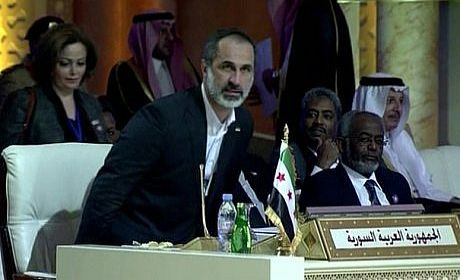Bashar Won’t Leave; Dialogue Not Ultimate Solution

The decision made by the Arab League to give Syria’s seat in this league to the “National Coalition for Syrian Revolutionary and Opposition Forces” and the decision made by Qatar to deliver Syria’s embassy in this country to this group are the most recent events which have taken place with regard to the Syrian crisis at the regional and international level. Nevertheless, the heads of state in the Arab League did not reach consensus in their decision to render Syria’s seat and countries such as Iraq, Algeria, and Lebanon did not give their positive vote to this part of the final declaration of the Arab League meeting. These decisions have been faced with the negative reactions of Iran and Russia. Although the lack of consensus among the heads of the Arab countries over this issue has impacted the significance of this decision in the international community, it can be said that these measures are new approaches with regard to the crisis in Syria.
The following points can be mentioned regarding the issues related to Syria:
1. At the present time, two axes have been formed in the region, one of which agrees with rapid developments in Syria and the other which is in disagreement with them. Events such as the ones which happened in Qatar show that one of the disputing regional parties attempts to change the present equation to its own benefit by strengthening the opposition forces through its aids and arms and also through uniting them. Nevertheless, due to serious differences between Assad’s opposition, members of the Arab League and members of the Security Council, one party does not have the necessary tools to change this balance to its own benefit.
2. Forces supporting Bashar Assad and his opponents are in conflict on the ground and none of them has yet to have enough force to control the situation and eliminate the other party. That is why none of the regional and international parties can count on any one of the two disputing parties and make decisions like the one that was made in Qatar. Due to developments on the ground in Syria, it does not seem that decisions such as the one made in Qatar would be the determining and conclusive decisions.
3. What can be concluded from the domestic conflicts in Syria is that this country is transforming into three completely different parts. One part is the Kurds who feel that their fate is somehow clearer, although the issue of the Kurds has its own complexities. The other part is the Sunni-populated areas in the center, in the north and in parts of the south about which it can be said that they are not under the control of the Syrian government and each part is controlled in its own form. In these regions, people mainly live on regional and international aids; although a great number of these people have been displaced inside or outside of Syria. The third part is the sectors upon which the government has dominance. In these regions, parts of the people support the continuation of the Bashar Assad regime. There are different estimates about the volume of Bashar Assad’s supporters; some state that that the majority of the people who live in these areas support the government, while others agree that the majority of the people are dissatisfied with Assad’s government. Although no accurate information and evidence is available, my evaluation is that, in these regions, the government enjoys national votes; the government of Bashar Assad might enjoy the ethnic votes and the minorities might support the continuation of Assad’s government due to their fear of the future, but the collective of minorities, even if they are looked at ethnically, do not form a majority that supports the government. Unfortunately, since the situation in Syria and the domestic war in this country have turned into ethnic disputes, assessing the national majority and minority seems difficult. Therefore, the government has dominance in these regions, and receives support from outside and also uses the capabilities of the military and security forces, the organizing forces of the Baath Party, and the motivated Alawi forces.
Based on these conditions, I still believe that neither a political nor a military solution can solve the crisis in Syria at the present time; not that such solutions are not possible, but right now no positive prospect can be seen for a Syrian exit from the present deadlock. The atmosphere and conditions are not ready for political agreement because neither side has the possibility to finish the dispute to its own benefit. Thus, only an international military intervention can change the present deadlock situation, but considering the existing special international circumstances, that seems impossible because it might lead to the disintegration of Syria and intensification of the crisis. Since there are serious concerns about rising differences in Syria in case of the downfall of the Assad regime and the dominance of irresponsible groups in various regions which would complicate the situation even more, there is no international agreement on one single method to solve the Syrian crisis, and those who can bring this situation out of the deadlock have not, hitherto, reached a decision to multilaterally enter the scene.
That is why everyone pursues a political solution. Some demand that Bashar Assad step down from power and some demand that both sides reach a political agreement through negotiation and dialogue. Nevertheless, it seems that neither of these proposals is possible under the present circumstances and Syria’s deadlock will possibly continue.

